Peter MALONE
Saturday, 09 October 2021 13:03
Just Getting Started
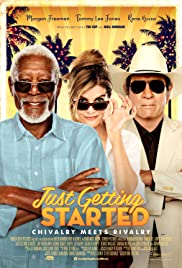
JUST GETTING STARTED
US, 2017, 91 minutes, Colour.
Morgan Freeman, Tommy Lee Jones, René Russoe, Joe Pantoliano, Glenn Headley, Sheryl Lee Ralph, Elizabeth Ashley, George Wallace, Graham Beckel, Mel Raido, Jane Seymour, Johnny Mathis, Nick Peine, Kristen Raikes.
Directed by Ron Shelton.
This comedy, with a touch of action, is intended for an older audience,, especially an older older audience. Actually, Morgan Freeman was almost 80 when he made Just Getting Started, and Tommy Lee Jones was just into his 70s. And so was the director, Ron Shelton, who was noted in the past for sports films, especially with Bull Durham, White Men Can’t Jump, Tin Cup…
We normally don’t see Morgan Freeman like this, relaxed, comic, into dance movements, not the sober, upright character of so many films. In fact, it seems he has worked for the Mafia, sold out, gone into Witness Protection, and has set up a lavish resort in Palm Springs. His new name is Duke and he is in command of everything, kindly manner, somewhat ruthless behind the scenes in his management, employing a fastidious little man who does his beck and call and is full of advice and anticipation of crises, but also a womaniser with three older women whose life seems to be flirting (and more) with Duke and any other of the men around. They are played by Glenn Headley, Sheryl Lee Ralph, Elizabeth Ashley (at 80).
While this might be the occasion for comedy at the resort, we learn instantly that a Mafia boss, played by Jane Seymour, sees an advertisement on TV, recognises Duke and hires her hitman son.
But, the complication is the arrival of Tommy Lee Jones as Leo, mysterious global background, beating Duke at poker, at golf (and Duke has a chorus of three old colleges following in adulation, and also cheating at golf for him), quoting the classics, skilled at painting…
And the further complication is the arrival of Susie, René Russo, seemingly a guest, but then having a task to confront Duke about the management of the resort. And a lot is made of the Christmas setting, Duke buying real camels for the crib, lots of popular Christmas songs and carols, a fight with centre!
And the hitman attempts… A snake in a golf bag, an exploding golf cart, bombs in a van, are unsuccessful. Which means that as Duke and Leo eventually bond, and are attracted to Susie, there has to be some kind of a showdown with the assassin, actually an initial failure as they both fall asleep on surveillance outside a motel, then Duke wanting to be a hero during the shootout.
Susie likes Johnny Mathis so Duke arranges for him to turn up to perform at the resort!
And a happy ending for all, satisfactory romance, Duke getting more opportunities in Witness Protection.
1. A film for older, veteran audiences? The cast, the characters, the situations, the comedy?
2. The Palm Springs settings, the resort, the lavish details of the resort, offices, clubs, dining, golf course…? The musical score? And Johnny Mathis and his singing?
3. The opening, Delilah, her phone calls, the hitman, revealed to be her son, wanting the hit on Duke, the motivations? Oscar and his explosions, snakes… Failing?
4. Duke, different performance from Morgan Freeman, relaxed? His courtesy towards everyone? Yet his strict management of the resort? Building it up? Jimmy and his constant attention, detail, alert to situations? Ginger as the assistant, attraction to Jimmy? Duke and his being skilled at poker, golf, proud of his work? Womanising? The later revelation that he was in Witness Protection? Yet Delilah seeing the television commercial?
5. Tommy Lee Jones as Leo, a variation on his usual performance? Arrival, skilled at poker, golf, poetry, painting, quoting the classics…? Duke and the suspicions, losing at poker, cheating at golf? Yet befriending Leo, relying on him?
6. Susie, guest, calm, attractive, Duke and his attentions? Leo and his courtesies? The revelation of who she was? The demands on Duke? Jimmy and Ginger and all the documents? Her role for the company, to fire Duke before Christmas?
7. The Christmas background, the decorations, buying the camels, the crib, the Christmas songs, the Christmas carols, the company Santa Claus and Duke fighting with him? The quiet singing of the hymns between Duke and Leo?
8. Susie, attracted to the resort, thinking about her job, not wanting to fail, wanting to support it? The meetings, interviewing Duke, looking at the books? Petty cash?
9. The attempts on Duke’s life, tracking down the assailant, the two working together, the night at the motel and sleeping and missing him, the pursuit of the van, the false driver, Oscar and his abducting Susie?
10. The rendezvous, Leo and the confrontation, Duke wanting to be a hero, creeping up the side of the trailer, the shootout? The rescue?
11. The range of supporting characters around the resort, the three women, provocative, in Duke’s room, with Leo, with the guests? Duke and his continued entourage, the three and their supporting Duke, cheating…?
12. A light entertainment for the oldies! Leo and Susie and romance? Duke with a new identity, a new location, a new resort!
Published in Movie Reviews
Published in
Movie Reviews
Saturday, 09 October 2021 13:03
Haunt
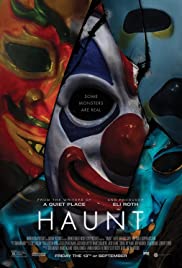
HAUNT
Canada, 2019, 92 minutes, Colour.
Katie Stevens, Will Britain,.
Directed by Scott Beck, Bryan Woods.
It is Halloween night. Everyone is in costume. There is an atmosphere of superstitions and fears.
The main part of this horror film takes place in an extraordinary Haunted House, out in the countryside. A group of young adults – the target audience for this kind of film that they might watch together, jumping in fear, laughing at the episodes and characters – have been out on celebration and drive out into the countryside, thinking they were followed, veering to a side road discovering the house.
The set designers have given a great deal of attention to the exteriors of the house, the wide range of interiors, many of which might be expected in some kind of ghost house, but far more extensive and weight wide-ranging, corridors, shoots, warehouse settings, corridors, mysterious doors…
In some ways, the main characters are interchangeable. The main human focus is on Harper (Katie Stevens), some sad flashbacks to her unhappy bringing up, her reticence, being persuaded to go out for Halloween. In a club, she encounters Nathan (Will Britain) and there is some bonding. This would be most important in the Haunted House, four women, two men, initially being scared, taking the challenge, finding ugly and mysterious creatures with masks, deadly episodes, an increasing body count.
There are various heroics but the final action focuses on Harper and Nathan.
So, instead of a visit to a haunted house at the carnival, here it is all put together in 90+ minutes of special effects and scares.
Published in Movie Reviews
Published in
Movie Reviews
Saturday, 09 October 2021 13:03
Little Things, The
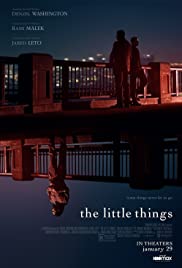
THE LITTLE THINGS
US, 2021, 127 minutes, Colour.
Denzel Washington, Rami Malek, Jared Leto, Chris Bauer, Michael Hyatt, Terry Kinney, Natalie Morales, Isabel Arraiza, Glenn Morshower, Lee Garlington.
Directed by John Lee Hancock.
The Little Things refers, of course, to attention to detail. However, the choice of the word little, has overtones of a certain daintiiness in detail. Not exactly the case here.
Over the last decade and more, audiences have become accustomed to see Denzel Washington as an action hero, in the West, in the gangster world, in police enforcement. This is police enforcement.
We know we are in sure hands when we see the reliable Denzel as Joe Deacon, serving in the Californian country community, going to Los Angeles to pick up evidence for a case. Actually, as you might expect, he has a history in Los Angeles, a top detective, but disappointed in a case, considering it failure, his resignation, divorce, moving out of the city. But, he still has instincts.
He meets friends in LA, does some revisiting of old haunts, making his base a seedy flophouse but is somewhat intrigued by a rather dapper young detective, suit and tie, giving press conferences concerning murders of women, the prospect of a serial killer. The young detective, Jimmy Baxter, has Rai Malek moving on from award-success with Freddie Mercury and a Bond villain. It seems unlikely at first, given the different styles of the two men, the older loner (and a visit to his ex-wife for a moment), the younger with wife and children, a family man. And so begins a practical apprenticeship.
Joe Deacon is shrewd, works behind the scenes, investigates where most would not think to search. Then, as soon as we see him, there is the potential villain, Albert Sparma, Jared Leto, penetrating eyes, suspicious, sinister…
Which means that a lot of the action of the film is cat and mouse work, Sparma being shrewd and manipulative. Eventually, of course, wild and confrontation.
However, there are some unexpected revelations at the end of the film, more about Joe Deacon and his past career, his work, his collaboration with the authorities in LA after a fatal shooting the understanding his motivations for his actions. His treatment of the younger man, tricked by Sparma, having to confront him, leading to a shooting which devastates him. Joe Deacon wants to help him, rehabilitate him.
So, while there is a great deal of action for action fans, there is an underlying human drama, played with seasoned experience by Denzel Washington and some ingenuous naivete by Rami Malek.
1. Police thriller? Investigation? Portrait of police, characters and work? The title and the reference to details
2. The 1990 setting, atmosphere, vehicles, posters? The Californian countryside and mountains? The highways? The city, streets, police precincts, flophouses, prostitute beats, shops, restaurants? The musical score?
3. The opening, the girl driving, the car in pursuit, the motel, escaping into the scrub, running out, the truck, the news of her death, violent murder? The information about the similar deaths? What they had in common? Many of the women prostitutes? The posters, the information, at the morgue, the bodies and examination?
4. Denzel Washington as Joe Deacon, age, police, in the country town, deputy, his boss, sending him to the city to collect evidence? In the city, his former boss, gradual
revelations about his work, workaholic, investigations, frustrations, no solutions, physical and mental break, divorce? The reactions of the police and the precinct? Friends, critics? At the morgue, his bond with the chief examiner?
5. Joe Deacon, noticing Jimmy Baxter, observing him, at the press conference? Their talking, interactions, breakfast, discussing the crimes, methods? The bonding between them? Jimmy in charge, yet apprenticed to Joe?
6. Jimmy Baxter, his age, experience, reputation, in charge of the investigation? At home, loving wife, the two daughters? Joe and his visit and charming the family? Jimmy as serious, suit and tie? Gradually mellowing, but intense in his pursuit of suspects?
7. The crime scene, Joe going, Jimmy in charge, the body, the fridge, the body moved? Joe and his going to the building opposite, the chair? The fingerprints?
8. Joe, revisiting the apartment, the landlady, the fridge, repairs? His going to the repair shop, the interrogation, the second shop, the glimpse of Albert Sparma, the Manson look?
9. The pressures on the police, the FBI coming in in two days?
10. Joe, accommodation, the flophouse, the photos on the wall, Jimmy and his visit? Joe and his flashbacks, in his heyday, in charge, the investigation, the memories of the posed naked bodies, the girl witness? The memories preying on his mind? The suspect brought in, the interrogation, the man’s fears, denials, Jo suggesting the name, the news that he killed himself?
11. Albert Sparma as the suspect, his appearance, personality, his work, fitting the profile? His apartment, car, going to the gentlemen’s club? Joe and Jimmy following him? His taunting them? Brought in, the interrogation, his playing with them? The decoy, Joe going into his apartment, the search, the box with the newspaper articles? Sparma and his shrewdness, calling the police that a policeman was down? Joe escaping over the roof?
12. The continued vigil, Joe going for coffee, Sparma coming out, taunting Jimmy, their driving away, Joe in pursuit? The gate, the abandoned area, the promise of the dead bodies, Jimmy and his interview with the dead girl’s parents, the video, his motivation? Digging? Sparma and his taunts, Jimmy hitting him with the shovel, his death?
13. Joe, arrival, taking the situation in hand, going back to the apartment, collecting everything? The burial, bringing Jimmy back to his family? Jimmy and time off, sitting by the pool, desolate, his wife’s concern?
14. Joe, his support of Jimmy and the killing of Sparma? Joe’s return home, burning all Sparma’s possessions?
15. The red emblem, sending it to Jimmy?
16. The revelation of the truth about Joe, the accidental shooting, its effect on him, breakdown, and the morgue official and the cover-up, that she was stabbed rather than shot, seeing the bullet removed?
17. The parallel between Joe and Jimmy, the deaths, the cover-up?
Published in Movie Reviews
Published in
Movie Reviews
Saturday, 09 October 2021 13:03
News of the World
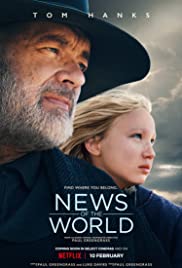
NEWS OF THE WORLD
US, 2020, 117 minutes, Colour.
Tom Hanks, Helena Zengel, Ray Mc Kinnon, Mare Winningham, Elizabeth Marvel, Michael Angelo Covino, Thomas Francis Murphy, Bill Camp, Fred Echinger
Directed by Paul Greengrass.
News of the World sounds quite a contemporary title. So, it is something of a surprise to find that the setting for this drama, this western, is 1870. And the setting is Texas, Confederacy territory, with bitter memories of the Civil War, the issues of slavery, the consequences of defeat, payment, and the fact that General Ulysses S Grant was president of the United States.
This is a Western and there are many familiar episodes. But, it is a different West. First of all, it is seen from the perspective of Captain Kyle Kidd who had served in the war, had been a printer before the war, had lost his wife to cholera, and was travelling the small towns of Texas, collecting newspapers, small gatherings in the town, everybody paying ten cents, listening to the stories that the Captain would choose, local stories of heroics, of natural disasters, but also stories of Federation which go down badly with the Texans bitter about the consequences of the war.
Tom Hanks plays the Captain, his going to the west for the first time. And, once again, Tom Hanks shows that he is the embodiment of American decency, a confident righteousness, a humanity that can be challenged.
But, what makes the difference to this story is his encountering a man hanged by racists, the carriage overturned, a little girl cowering. While the Captain wants to entrust her to the military, they refuse and order him to go to the authorities for her to be taken back to an uncle and aunt. The documents indicate that her family had been killed by the Kiowa Indians and she had been taken and had lived with them, learning their language, absorbing their culture, but they too had been massacred.
Which means that the film is something of a road film on the American West trails. The Captain and the little girl, Johanna, though she indicates her name from the Kiowa is Cicada, experience a number of Western adventures which keeps the film interesting and at times, frightening and exciting. They go to a town where the owner of the boarding house is able to speak the Kiowa language and tell the Captain something of the girl’s story. There are former soldiers who want to buy the girl and pursue them into the mountains, a subsequent shootout. Their carriage crashes and the horses need to be put down. They have to trek through vast plains.
There is an enormous tornado. There is a strange self-contained community of workers, slaves under the domination of a drunken exploiter. There is an encounter with homeless Indians on the move.
Which means then that the film is episodic but continually interesting as the two begin to bond, despite the limited language, despite the girl’s fears.
And the strength of the film is very much in the performance by Helena Zengel as Johanna. The very young, the actress was acclaimed at the Berlin Film Festival of 2019 for her performance as a wilful young girl in The System Crusher. Here she is able to hold her own with Tom Hanks – and an indication of a successful future career.
And the film has many moving moments – but, a literally happy ending as the captain reads the news but then tells his eager audience and amusing shaggy dog story. Which amuses them – but also amuses us, bringing to a close the couple and their wanderings and our sharing their adventures with them.
1. Impact of the film, acclaim, nominations?
2. The title, expectations? 19th century, pre-audiovisual media, newspapers, citizens and their capacity to read, in the countryside of Texas, the emerging towns after the Civil War, hard-working people, gathering to listen to the news? Capt Kidd and his mission to read the news?
3. 1870, the Texas settings, the vast countryside, plains and mountains, the towns, large and small, Dallas emerging, streets, shops, boarding houses? The small settlements in farms? The separating communities and their lifestyle? Indicating changes in the West?
4. Kids story, Tom Hanks and his screen presence, dignity, righteous, humane? Filling out the background of his life before the Civil War, as a printer, relationship with his wife, leaving her for the war, cholera and her death? His pained memories? His role in the war, service? The Confederacy? His role after the war, collecting the newspapers, the small communities, gathering, the Ten cents, listening to the news, his close-up reading the paper, his delivery, information and entertainment?
5. The overturned carriage, finding the little girl, her reaction, his reaching out to her, lack of verbal communication, the encounter with the soldiers, his finding the documents, the agent hanged, the races? His having to keep the girl, decision to take her to her family?
6. The little girl, her age, the German background, the death of her parents, taken by the Kiawah Indians, growing up with them, the language? The mixed memories? Strong character, he fears, with Kidd, resistance, running away? The trek, communications, gradually saying words? Examining the contents of his cases? The difficulties of bonding?
7. Kidd taking her to the town, his friend and his wife, memories of the war, their kindness, taking the girl in? Their not being able to help her?
8. On the Trail, a 19th-century road film, the mundane details of the trip, food, water, communication?
9. The visit to Dallas, the widow, her memories, relationship with Kidd? Her speaking the Kiawah language, opening up communication, knowledge?
10. The veterans from the war, pursuing Kidd, wanting to buy the girl, their vicious attitudes, Kidd and the girl, the escape, the carriage, into the mountains, hiding, the pursuit, kids military skills, deceits, the girl and the coins for his shot gun, escaping from the enemies?
11. Being surrounded on the Road, Farley and his community, their being taken in, Farley in charge, drinking, the workers, virtually slaves, the invitation for Kidd to read, the local paper, rather his telling the story from Pennsylvania and the workers rebelling? Starting the fight and escaping? Jack Kelly, the enthusiastic young man, listening to the stories, escaping with them? The confrontation with Farley, the guns, the girl and her shooting?
12. The tornado, thinking it was horses, the vastness of the winds and sand, survival?
13. The encounter with the Indians, the sad fate of the Indians, wordless comment on the images, the girl getting the horse, the being able to write to safety after walking through
the desert and the wreck of their carriage, the death of the horses?
14. Finding the girls uncle and aunt, very German, hard-working, suspicious, the background story, Kidd leaving the girl with them? His later return, her being tied up, taking her away?
15. Going to San Antonio, the discussions with his friend, the death of his wife, the visit to the cemetery? Closing the past, opening the future, his return to take the girl?
16. The bond between them, their shared experiences, learning language and sharing, her hardships, his rescue?
17. The happy ending, reading the papers, the crowds enjoying the stories, the jokey story about the man rising from the dead, the girl making sound effects, the applause, bowing, and a very happy and cheerful ending for such a story?
Published in Movie Reviews
Published in
Movie Reviews
Saturday, 09 October 2021 13:03
Another Round/ Druk
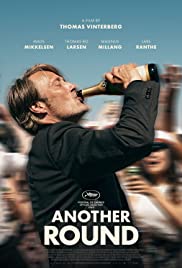
ANOTHER ROUND/ DRUK
Denmark, 2020, 117 minutes, Colour.
Thomas Bo Larsen, Magnus Millang, Lars Ranthe, Maria Bonnevie.
Directed by Thomas Vinterberg.
One might call this a sobering film. It focuses on a group of middle-aged men, an experiment with alcohol, the consequences for them in their own lives, in their relationships and profession, a final challenge which is sobering – or not. (And that Danish title needs only an ‘n’ inserted for drunk! In fact, the word is more active, meaning ‘drinking’.)
This is a Danish film which will have resonances in countries around the world, especially those with alcohol problems (with the screenplay here making comment on their prevalence in Denmark), and especially with a male audience. The director, Thomas Viniterberg, has been making striking and significant films for over two decades, beginning in the 1990s with the philosophy of pure filmmaking, Dogme (Festen), but then moving into more complex filmmaking, in Danish (The Hunt, with the star of this film, Mads Mikkelson) as well as in English (Dear Wendy, Far from the Madding Crowd).
There is quite a raucous opening, but this time amongst the high school students, a competitive race, runners having to down a bottle of beer at each stage, points deducted for any vomiting, and the other students cheering, leering, a celebration.
Then we see some of those students in class, bored to tears by their history teacher, Martin (Mads Mikkelson), who seems to be somewhat depressed, being summoned to a meeting of students and parents to improve his methods. At home, he sees his sons lounging about, and seems sometimes remote from his wife who has nursing night shifts. He relies on his friends at the school, Thomas who is a sports trainer (and some engaging moments with his little charges, especially Specs, who has some champion moments), Nikolai, psychologist, married with three children, including a recent baby, and Peter, music teacher and choirmaster.
Nikolai comes up with information about a theory from a Swedish psychologist that as human beings we are 0.05 under the expected limit for alcohol in our bodies. Then, a somewhat mad (juvenile?) decision, to check whether the theory is correct or not. On the one hand, a lot of binge drinking, hidden drinking, but only during the daytime, nothing at night. On the other hand, each of them comes more alive than they have been for years, Martin beginning to enthuse his class and relate well with them.
So, the tantalising drama for the audience is whether they will prove the theory or not (most of us thinking that it is nonsense and the experiment, which they begin to write up, fore-doomed). Also tantalising is the portrait of each of them as they experience the effect of more and more alcohol, finding occasions and excuses, and the consequences in school and out of school, and Martin and Nikolai and their relationship with their wives.
Some tragedy, some joy, and we leave the cinema wondering how it is going to turn out, especially for Martin who has grown more desperate.
1. The title? Danish for drinking? The English title and the social aspects of drinking? The collage of public leaders seen drunk, Yeltsin, Sarkozy, Brezhnev…?
2. The Copenhagen setting, ordinary life, the different homes, the school, classrooms, offices, playing fields? Clubs and restaurants? The musical score?
3. The mood of the opening, the students, the race and competition, the drinking of the beer, vomiting, the students egging on the competitors?
4. The introduction to the central characters, their age, long friendships, reliance on each other? Martin, at home, distance from his wife, her night shifts as a nurse, interactions with his two sons, their lounging around? His dull performance in the classroom? Nikolai, psychological background, wife, children, the baby, wetting the bed…? Thomas, sports coach, his heart not in it, burnt out? Peter, reticence, the piano, the choir, the discussions about Kierkegaard? Their bonding?
5. The Scandinavian theory about alcohol, the human body needing more? The men and their discussion, their patterns of drinking, the decision to do the experiment and write it up? The decision to drink extensively during the day, but not at night?
6. The sequences and collages of the drinking, openly, hidden? Thomas hiding his alcohol in the shed? The suspicions of the headmistress and her comments about drinking?
7. The effect on each of the men, Martin meeting the parents and students and their complaints, wanting to prepare for the exam, his breaking up, becoming personable, the story of hiring Roosevelt Churchill or Hitler? Involvement, their learning, the students’ enthusiasm?
8. Thomas, at the sports, Specs, Thomas’s initial disdain, the matches, Specs and his success?
9. Peter, the choir, the patriotic song, his enthusiasm? His friendship with the depressed boy, meeting him, encouraging him, the suggestion that he drink before the exam, the questions about Kierkegaard and failure?
10. Nikolai, his relationship with his wife, writer, yet her exasperation – and the sequence of his wetting the bed?
11. Martin and his marriage, the approach to his wife, the discovery of her relationship, her leaving, the issue of the boy’s birthday party, Martin becoming more desperate, contacting his wife, wanting reconciliation? The meeting in the cafe? Her leaving?
12. The consequences of the drinking, more and more out of control? Thomas, depression, talking about his friendship, going out on the boat, his death? The effect on the others?
13. The finale, the exams, the exuberance of the students, congratulations, the drinking, each of them drinking more, Martin drinking more, the background of his dancing, his friends trying to make him dance in the past, his now exuberant dancing, his dive towards the water and the frame freezing?
14. What future for each of them?
15. The impact for the audience, the men, middle-aged men? For drinkers?
Published in Movie Reviews
Published in
Movie Reviews
Saturday, 09 October 2021 13:03
Transhood
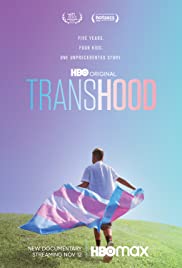
TRANSHOOD
US, 2020, 96 minutes, Colour.
Directed by Sharon Liese.
A significant HBO documentary. As the title indicates, it is a film about transgender issues. What is distinctive is that it focuses on four younger people and traces their changes in development over a period of five years. It is reminiscent of the method used by Michael Apted in the Seven-Up? series.
The film introduces the four central characters but then uses a linear method, starting in 2014 and ending in 2019, tracing phases year by year. And the stories are intercut, each of the story is interesting but also commenting on the others.
The initial focus is on a young girl, Avery, not yet 10. Born with male characteristics, Avery has opted to be a girl, dress, appearance, coloured hair (which she maintains throughout the years). She is supported by her parents, especially by her mother who explains that she knew nothing about transgender issues but supported her daughter, became better informed, then moved to making public appearances to promote the cause. The film shows Avery at different stages, though with quite a consistency about her life choices, quite articulate in her expression. She is also chosen by National Geographic to appear on a cover with the contents on transgender issues. She becomes something of a celebrity at meetings, signing books, but there are talking heads denouncing her and the whole issue of a child being able to choose its sexual identity.
The next character is a young boy, Jay, 12 at the opening of the film. He was born with female characteristics but has opted to be a boy, a strong choice, strong convictions, working with his mother who is involved in quite a learning process. Jay’s father leaves and the couple are divorced. His mother then meets a woman, they enter a relationship and are married, Jay consenting. One benefit from the marriage is that Jay is legally their son and there are greater opportunities for insurance coverage of his treatment. Jay acts like a boy throughout the film, going through puberty, on some medications and injections, finally moving to the end of school, taking a girl out to the Prom, college ahead of him.
The third focus for the film is Leena, born with male characteristics, but, from an early age, identifying as a girl, wearing female clothes, a completely female demeanour. She is supported by family, and, especially, by a strongly-spoken grandmother. Leena does her studies, makes friends, especially having a boyfriend who knows about her condition. Her ambition is to be a model is one focuses on her going to auditions, promises, knowledge about the truth of her identity, her being dropped. Nevertheless, she demonstrates presence in style for a modelling career.
The fourth focus in the film is Phoenix, starting at age 4, Phoenix identifying with being a girl rather than a boy, her manner, clothes, play, when speaking. She is supported by her parents even though they divorce. There is less attention given to her throughout the film and, by the age of seven, Phoenix decides that he is a boy, adopting boys’ clothes, talking as a boy, stereotypical boys’ behaviour. Some have objected about the four-year-old being the subject of a film and participating in the making.
Most films and discussions about transhood, transgender living, sexual realignment and surgery, focus on young adults or older adults. This film is interesting in that the focus is on childhood without the trappings of contemporary sexual discussions, identity, homosexuality…
British television series with Anna Friel, Butterfly, takes of the issues in Britain, with a young boy and excursions to the United States for medical and surgical treatment. An American film on this theme is My Name is Jake, with Jim Parsons and Claire Danes as the parents dealing with their young son and his option to be a girl.
Published in Movie Reviews
Published in
Movie Reviews
Saturday, 09 October 2021 13:03
Truffle Hunters, The
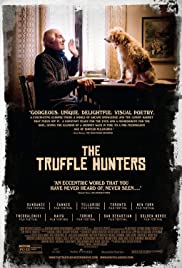
THE TRUFFLE HUNTERS
Italy, 2020, 84 minutes, Colour.
Directed by Michael Dweck, Gregory Kershaw.
Possibly the first question to ask most audiences is: what exactly is a truffle? And a follow-up question: have you ever eaten truffle? A great number of responses would be in the negative.
This brief documentary does not answer every question about truffles but leads the audience to northern Italy, the Piermont area, centring on Asti at the foot of the Alps. It seems that the forests in this area are a key growing ground for truffles, though they are still fairly rare, have to be sought out by experts, the truffle hunters, and the special truffle hunters, their dogs who go sniffing through the forests, digging up the soil, revealing the rare truffles.
For those of an economic/financial frame of mind, there is a line in the film which reveals that truffles sell at €4500 a kilo. There are scenes of local sales and bargaining where prices for the truffle hunters are much, much lower.
The whole film is something of a jigsaw – or, perhaps, mosaic might be a better word. In fact, the various sequences could have been placed in any order and the result be much the same.
The film opens with one of the old codgers, the veteran truffle hunters, with his dogs, climbing a forest hill. He appears throughout the film – and shows himself quite an expert drummer and percussionist. One of the other old codgers, Carlo, is 84, with a rather dominating wife who summons him into the house, to meals, and does not want him to go out during the night still in search of truffles, for fear of accidents. He climbs out the window! Then there is another eccentric old man who has given up truffles, works in mechanics, but sits at an old typewriter writing his poems. They are the main characters we get to know and to see in action, and are, absolutely, devoted to their dogs. (Definitely a film for dog lovers.)
Then we have the background of the truffle agents, some part of a family dynasty in this work, urging the old men to go out to find more, doing financial deals, talking about orders coming in from all over the world. Then there are the more official sales, experts examining the truffles for their quality, and everybody, everybody, continually sniffing the truffles. There is something of a dignified exhibition, some of the truffles rather enthroned for observation. And, the chief tester and taster having a meal of eggs and fondue, with grated truffle sprinkled over. He responds with gourmet satisfaction.
The company that made the film, also with the strong backing of the Sundance Institute and Festival, is called Beautiful Stories. Depending on one’s liking for documentaries, for exotic growth and culinary interests, for stories about old men and dedication, and a liking for dogs, this multi-award-winning film, will be a pleaser. (For those for whom truffles are dirty and ugly old funghi, perhaps not,)
Published in Movie Reviews
Published in
Movie Reviews
Saturday, 09 October 2021 13:03
Wrong Turn/ 2020
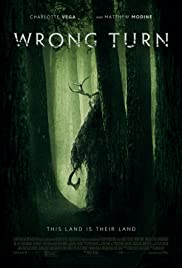
WRONG TURN
US, 2021, 109 minutes, Colour.
Charlotte Vega, Matthew Modine, Bill Sage, Adaiin Bradley, Dylan Mc Tee, Daisy Head, Emma Dumont, Valerie Jane Parker, Rhyan Elizabeth Hanavan.
Directed by Mike P.Nelson.
Wrong Turn is a pretty good title for a creepy thriller. In fact, it was used back in 2003, a group of young people, the Virginia mountains, difficult tracks and treks, mysterious inhabitants in those mountains. Good reviews. Fan support. And the title held good for another four sequels from 2007 to 2011 with added themes to the titles: Dead End, Left for Dead, Blooody Beginnings, Bloodlines.
And, in 2021, here we are again. But, better.
Prolific writer, from Star Trek to horror films, Alan McElroy?, created the original characters and wrote the screenplays for the sequels. He has written this film. We are back to a group of young adults trekking the Appalachian mountains, warnings from the locals, looking eerie and suspicious, not to veer from the tracks, that nature devours travellers and no one returns. But, this time the subtitle of the film is: Foundation. And we discover what Foundation means, quite an arresting idea, that in 18 59, 12 families took to the mountains, prior to the Civil War, and set up a society that would be an exemplar so that if the world collapsed, the members of the Foundation and their descendants could emerge.
However, the film opens with veteran Matthew Modine as a father searching for his daughter who was one of the trekking group. The locals are not particularly welcoming or helpful. Then the action goes back six weeks to the group arriving in the town, getting the same warnings.
The six adults on trek are not entirely sympathetic. The main one who is is Jennifer, Charlotte Vega (who has some action sequences which she could do because she was a star of the Netflix series, Killer Nuns!). Matthew Modine is her father. Her boyfriend is the leader of the group, urging them to go off the beaten track to see a Civil War fort, only for them to get lost (understatement) and experience weird goings-on in the woods.
So, a lot of weird scenes, characters wearing huge animal masks, stalking the group, vicious traps in the forest, lots of fear – and, one of the characters, more than smugly arrogant, denouncing these backwoods people. (We look forward to his comeuppance!)
Actually, these are not supernatural experiences at all. It is the members of The Foundation, the descendants of the original people, preserving their isolation (although we have seen the daughter of the leader and a little girl in town and selling souvenirs). Actually, the members of the foundation are rather barbaric, despite their claims that they are not, with a large prison, execution rites…
There are some flashbacks to the father, then he takes centre screen for a while, locals offering to help him search for his daughter, experiencing the traps in the woods, face-to-face with the Foundation members, and seeing the fate of his daughter.
There are sufficient twists and turns, some wrong turns, to keep us alert – and the screenwriter seems to have prepared three possible endings, and includes them all. One seems ordinary enough. The other is a dramatic trick. And, just as the credits start to come up (and a warning not to leave), the third and final ending (quite effective) takes place as the credits roll.
The young adults are prone to limited vocabulary over-swearing – something which tapers off as we encounter the foundation people. There are some gory moments. But, overall, this is an entertaining variation on its themes.
Published in Movie Reviews
Published in
Movie Reviews
Saturday, 09 October 2021 13:03
Malcolm and Marie
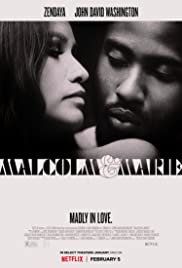
MALCOLM AND MARIE
US, 2021, 106 minutes, Black-and-white.
Zendaya, John David Washington.
Directed by Sam Levinson.
Words can be brutal. Silence after brutal words can be healing.
And we share these experiences with Malcolm and Marie. While their conversations and recriminations are complex, this story is filmed in stark black and white.
Malcolm (John David Washington, BlackKklansman, Tenet) is a film writer-director, returning from a successful premiere of his new film, audiences responsive, critics praising. He is on an adrenaline high, singing and dancing around the kitchen, beyond exuberant. Marie, (Zendaya, The Greatest Showman, Euphoria) is his partner, dressed stylishly for the occasion, rather silent but cooking macaroni cheese for Malcolm (which he devours avidly).
Then the point – or at least the initial point… No, after 90 minutes, it is definitely the point. Malcolm has not thanked Marie publicly, omitted from his huge list of thanks, badly-unconsciously overlooking her. Her reminder is an accusation. In fact, there are layers and layers under Malcolm’s exuberance. Marie challenges him to go down into those layers. As their interchanges go on, emotionally gruelling for them, emotionally gruelling for us, the audience. How do we identify? With whom? Different points of view, different perspectives, changing sympathies.
Malcolm is a bluff male, dominant, self-assured, shocked at Marie’s outburst and sustained attack, an onslaught. And he is shamed by his behaviour. But he goes on the attack, questioning her motives, revealing her past story, the past, drug addiction, which he has incorporated into his film.
But she goes deeper. Why didn’t he cast her in her own story?
John David Washington is convincing as Malcolm. But Zendaya has the more complex role, more complex and tortured character, having more mood swings – and a powerful scene with a resume of her painful past. And writer-director, Sam Levinson, gives her a marvellous sustained monologue where she puts a long list of gratitude and thanks into Malcolm’s mouth.
After the verbal and emotional battle, comes the realisation of their love, and the film ends in silence.
Published in Movie Reviews
Published in
Movie Reviews
Saturday, 09 October 2021 13:03
Importance of Being Earnest, The/ 2018
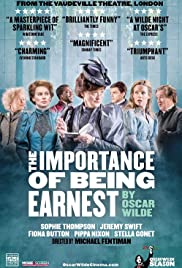
THE IMPORTANCE OF BEING EARNEST.
UK, 2018, q25 minutes, Colour.
Jacob Lloyd- Fortune, Fehinti Belogun, Sophie Thompson, Pippi Nixon, Fiona Button, Stella Gonet, Jeremy Swift.
Directed by Michael Fentiman.
There have been many film versions of Oscar Wilde celebrated play, the classic, almost archetypal, being that of 1952, directed by Anthony Asquith, and elegant performances from Michael Redgrave and Michael Denison as Ernest and Algernon, an unforgettable Edith Evans as Lady Bracknell, a dithering Margaret Rutherford as Miss Prism, Miles Malleson as an also dithering Canon Chasuble, and the restraint and charm of Joan Greenwood and Dorothy Tutin as Gwendoline and Cecily.
Wilde would have been very pleased with the elegant diction of his words, as well as the charming restraint of the performances.
There was an all-star version in 2002, Colin Firth and Rupert Everett, Frances O’ Connor and Reese Witherspoon, and Judi Dench as Lady Bracknell (given a background of her being a chorus girl in vaudeville!!). Much of the delightful dialogue was omitted.
David Suchet then took the role of Lady Bracknell on stage and there was a film version of the play.
A 2018 audience unfamiliar with the 1952 version is heard laughing heartily in the background of this version of a stage performance at London’s Vaudeville Theatre. For those whose memories are in the past, this will not be as pleasant an experience.
Sophie Thompson is a variation on Lady Bracknell and brings some insight into her character. The two actresses as Gwendoline and Cecily are quite aggressive in character and in performance (too aggressive for Wilde’s text). Stella Gonet is very straight-up-and-down as Miss Prism, giving no indication that she would ever have been dithering and losing the handbag.
The two leads as Ernest and Algernon do their best – and, there is the surprise of the black actor, Fehinti Belogun in the role of Algernon, British theatre casting black actors in classic roles on stage and in cinema.
Published in Movie Reviews
Published in
Movie Reviews